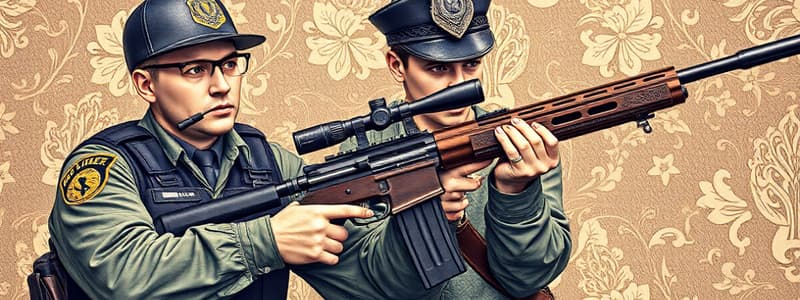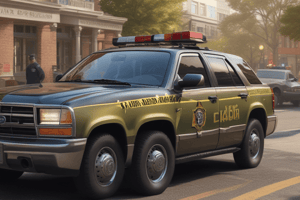Podcast
Questions and Answers
What is the correct configuration of the LEPR when in the patrol vehicle rifle rack?
What is the correct configuration of the LEPR when in the patrol vehicle rifle rack?
- Magazine removed and hammer uncocked
- Magazine fully loaded and chamber empty
- Bolt is forward/closed on an empty chamber with a full magazine minus 2 rounds (correct)
- Safety is off and dust cover is open
Which step is NOT part of loading the LEPR into 'Patrol Ready' condition?
Which step is NOT part of loading the LEPR into 'Patrol Ready' condition?
- Close the dust cover after seating a loaded magazine
- Close the bolt on the empty chamber
- Ensure the muzzle is pointed in a safe direction
- Physically inspect the magazine for rounds (correct)
In which scenario should the LEPR be in the 'Action/Loaded Carry' condition?
In which scenario should the LEPR be in the 'Action/Loaded Carry' condition?
- For short-term law enforcement storage
- When the rifle is not in active use
- When the rifle is out of the vehicle due to a high-priority call (correct)
- When preparing the rifle for routine checks
What must be confirmed during the final checks of a proper transport carry condition?
What must be confirmed during the final checks of a proper transport carry condition?
What is the required condition for a LEPR when carried in a vehicle's trunk?
What is the required condition for a LEPR when carried in a vehicle's trunk?
Which of the following describes a condition where the rifle is prepared for administrative purposes?
Which of the following describes a condition where the rifle is prepared for administrative purposes?
What is the minimum standard for a mounted light source on a LEPR?
What is the minimum standard for a mounted light source on a LEPR?
What must deputies carry when they have a LEPR on their person?
What must deputies carry when they have a LEPR on their person?
How should any accessories for the LEPR be approved?
How should any accessories for the LEPR be approved?
What is the trigger pull weight range for the LEPR?
What is the trigger pull weight range for the LEPR?
What must deputies do before carrying a personally owned LEPS on-duty?
What must deputies do before carrying a personally owned LEPS on-duty?
What is an approved accessory for personally owned LEPS as per the guidelines?
What is an approved accessory for personally owned LEPS as per the guidelines?
What is the minimum passing rate in the yearly re-qualification course for deputies carrying a LEPS?
What is the minimum passing rate in the yearly re-qualification course for deputies carrying a LEPS?
Which of the following is NOT a requirement for BCSO-owned LEPS?
Which of the following is NOT a requirement for BCSO-owned LEPS?
What is required for deputies who wish to carry a law enforcement patrol shotgun (LEPS)?
What is required for deputies who wish to carry a law enforcement patrol shotgun (LEPS)?
Which component must be kept within factory specifications for all LEPS?
Which component must be kept within factory specifications for all LEPS?
For BCSO-owned LEPS, what is required for any other accessories not explicitly mentioned?
For BCSO-owned LEPS, what is required for any other accessories not explicitly mentioned?
What does the initial qualification for carrying a LEPS consist of?
What does the initial qualification for carrying a LEPS consist of?
What happens to a deputy who fails to qualify with the LEPS on their second attempt?
What happens to a deputy who fails to qualify with the LEPS on their second attempt?
In what scenario is deploying a LEPS particularly necessary?
In what scenario is deploying a LEPS particularly necessary?
Who usually makes the decision to deploy a LEPS?
Who usually makes the decision to deploy a LEPS?
What must occur if there is no on-duty supervisor present when considering LEPS deployment?
What must occur if there is no on-duty supervisor present when considering LEPS deployment?
Which situation is an example of a tactical necessity for deploying a LEPS?
Which situation is an example of a tactical necessity for deploying a LEPS?
What is one of the conditions that would not warrant the deployment of a LEPS?
What is one of the conditions that would not warrant the deployment of a LEPS?
Which of the following best describes why it's impossible to set every scenario in writing for LEPS deployment?
Which of the following best describes why it's impossible to set every scenario in writing for LEPS deployment?
Flashcards
LEPR Unloading Procedure
LEPR Unloading Procedure
The Law Enforcement Patrol Rifle (LEPR) must be unloaded and visually inspected before handling.
LEPR Storage
LEPR Storage
When not in the rifle rack, the LEPR should be stored in the vehicle's trunk in a protective case, in "Patrol Ready" condition.
LEPR Certification
LEPR Certification
Each officer must carry an official LEPR certification card whenever the LEPR is on their person.
LEPR Sling
LEPR Sling
Signup and view all the flashcards
LEPR Light Source
LEPR Light Source
Signup and view all the flashcards
Patrol Ready LEPR
Patrol Ready LEPR
Signup and view all the flashcards
Action/Loaded LEPR Carry
Action/Loaded LEPR Carry
Signup and view all the flashcards
Safe Carry LEPR
Safe Carry LEPR
Signup and view all the flashcards
LEPR Transport Carry Condition Checks
LEPR Transport Carry Condition Checks
Signup and view all the flashcards
LEFT/RIGHT Loaded Magazine Technique
LEFT/RIGHT Loaded Magazine Technique
Signup and view all the flashcards
When to Use the LEPR
When to Use the LEPR
Signup and view all the flashcards
Who Deploys the LEPR?
Who Deploys the LEPR?
Signup and view all the flashcards
Deputy's Discretion with LEPR
Deputy's Discretion with LEPR
Signup and view all the flashcards
Failing LEPR Qualification
Failing LEPR Qualification
Signup and view all the flashcards
Reapplying for LEPR Qualification
Reapplying for LEPR Qualification
Signup and view all the flashcards
LEPR Deployment Guidelines
LEPR Deployment Guidelines
Signup and view all the flashcards
Flexibility of LEPR Deployment
Flexibility of LEPR Deployment
Signup and view all the flashcards
Where to store the LEPS?
Where to store the LEPS?
Signup and view all the flashcards
Required accessory for the LEPS?
Required accessory for the LEPS?
Signup and view all the flashcards
How much ammunition should you carry with the LEPS?
How much ammunition should you carry with the LEPS?
Signup and view all the flashcards
What light source is recommended for the LEPS?
What light source is recommended for the LEPS?
Signup and view all the flashcards
Is a shortened stock allowed for the LEPS?
Is a shortened stock allowed for the LEPS?
Signup and view all the flashcards
Who approves LEPS accessories?
Who approves LEPS accessories?
Signup and view all the flashcards
What mandatory training is required for LEPS?
What mandatory training is required for LEPS?
Signup and view all the flashcards
What's the annual requirement for carrying the LEPS?
What's the annual requirement for carrying the LEPS?
Signup and view all the flashcards
Study Notes
Law Enforcement Patrol Rifle Procedures (B-8.01)
- Deputies carrying a Law Enforcement Patrol Rifle (LEPR) must meet policy requirements.
- Three constant carry conditions: muzzle pointed safely, finger off trigger, safety "ON".
- "Patrol Ready" configuration in vehicle: bolt forward/closed (empty chamber), safety "ON", hammer cocked, dust cover closed, full magazine (minus 2 rounds), sling ready.
- Loading procedure: point muzzle safely, safety "ON", trigger indexed, remove magazine, open action/lock bolt rear, visually inspect chamber for unloading, close bolt, seat loaded magazine, close dust cover.
- Five checks confirm transport carry condition: safety "ON", empty chamber, full magazine (minus 2 rounds), sling properly prepared, dust cover closed.
Action/Loaded Carry
- Action/Loaded carry condition used when rifle needs immediate access outside vehicle.
- Muzzle pointed safely, safety "ON", trigger indexed, full magazine (minus 2 rounds) loaded, work action to load round in chamber, press check chamber, deploy sling, close dust cover if applicable.
Safe Carry
- Rifle prepared for short-term storage/administrative purposes.
- Muzzle pointed safely, safety "ON", trigger finger indexed, remove magazine, open action, visually inspect chamber, lock bolt to rear, ensure weapon is unloaded, use high visibility chamber block or forward chamber flag for safety.
Accessories - Personally Owned LEPR
- LEPR equipped with approved sling.
- May have mounted light or night sights (minimum 60 lumens).
- Accessories inspected and approved on a case by case basis. If equipped with electronic sights, a back-up rear sight is required.
- Trigger pull must be between 4.5 and 6.5 pounds.
- Magazines with capacity exceeding 30 rounds not authorized.
- Type of sights (metal or polymer-like materials, or electronic) dependent on system.
Accessories - County-Owned LEPR
- LEPR equipped with approved sling.
- May have mounted light or night sights (minimum 60 lumens).
- Accessories inspected and approved on a case by case basis. If equipped with electronic sights, a back-up rear sight is required.
- Trigger pull must be between 4.5 and 6.5 pounds.
- Magazines with capacity exceeding 30 rounds not authorized.
Qualification Course
- Deputies must complete a three-day (24-hour) rifle course offered by the department.
- Initial qualification requires passing a standard marksmanship course, meeting or exceeding TCOLE rules.
- Annual recertification class (four hours minimum) with a re-qualification course of fire.
- 90% minimum score required
- Deputies failing to qualify on two attempts cannot carry a LEPR.
- Combat-fire and 10 rounds of handgun required portions of qualification.
Deployment
- Guidance provided for situations where deployment of a LEPR might be necessary, such as suspicious suspect behaviors (wearing body armor, weapon with superiority, etc.); suspect's position or location requiring tactical action (situations requiring tactical superiority, barricaded suspects, perimeter security, etc.).
- Supervisor may deem LEPR needed, otherwise at deputy's discretion.
Use of Deadly Force
- Deputies must be aware of the risks associated with shot placement of rounds (risk of over penetration, etc.).
- Deputies must adhere to local force guidelines in relation to deploying a firearm (Sheriff's policy and procedure manual).
- Policy does not supersede established force guidelines (Texas Penal Code, Chapter 9).
- Deputies must adhere to the risks of missed shots.
Studying That Suits You
Use AI to generate personalized quizzes and flashcards to suit your learning preferences.




